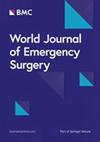Surgical stabilization of rib fractures improves survival in functionally dependent trauma patients
IF 5.8
1区 医学
Q1 EMERGENCY MEDICINE
引用次数: 0
Abstract
Rib fractures are frequently encountered in trauma care and are particularly hazardous for functionally dependent patients, leading to increased morbidity and mortality rates. Surgical stabilization of rib fractures (SSRF) improves outcomes in selected populations; however, its role in functionally dependent individuals remains underexplored. A retrospective cohort analysis was conducted using the American College of Surgeons-Trauma Quality Improvement Program dataset from 2020 to 2022. Patients with three or more rib fractures and AIS (Abbreviated Injury Scale) greater than 3 for the rib and thoracic wall, along with documented functional dependency, were included. Propensity score matching (3:1) was applied to reduce the selection bias between patients receiving SSRF and those managed conservatively. The main outcomes of interest were in-hospital mortality, acute respiratory distress syndrome, unplanned intensive care unit (ICU) admission, unplanned intubation, and ventilator-associated pneumonia (VAP). A subgroup analysis compared early (≤ 72 h) versus late SSRF. Among 18,643 eligible patients, 359 (1.9%) underwent SSRF. Before matching, patients with SSRF had higher Injury Severity Scores (ISS), ICU admissions, and complication rates. After matching (294 SSRF vs. 883 conservative patients), SSRF was associated with significantly lower mortality (4.8% vs. 8.7%, p = 0.038) despite higher rates of unplanned ICU admission (11.2% vs. 7.0%, p = 0.031), unplanned intubation (10.2% vs. 6.1%, p = 0.026), and VAP (3.1% vs. 0.6%, p = 0.002). In the subgroup analysis, early SSRF led to fewer ventilator days (p = 0.013), and shorter ICU (p < 0.001), and hospital length of stays (LOS, p < 0.001), with no difference in mortality compared with late SSRF. However, the late SSRF group still had significantly lower in-hospital mortality compared to the conservative treatment group (3.8% vs. 10.9%, p = 0.023). SSRF in functionally dependent trauma patients with multiple rib fractures and significant chest wall injury (AIS ≥ 3) is associated with a significant reduction in in-hospital mortality compared to conservative management, despite a higher incidence of complications and prolonged ICU LOS. Early SSRF further improves clinical outcomes by decreasing ventilator duration and overall hospital LOS. These findings support the consideration of SSRF—particularly when performed early—as a beneficial strategy for managing rib fractures in functionally dependent patients. Even when performed at a later stage, SSRF still offers advantages over conservative treatment in reducing mortality. prospective studies are warranted to validate these results and establish clear patient selection criteria.手术稳定肋骨骨折可提高功能依赖创伤患者的生存率
肋骨骨折在创伤护理中经常遇到,对功能依赖的患者尤其危险,导致发病率和死亡率增加。肋骨骨折手术稳定(SSRF)改善了特定人群的预后;然而,它在功能依赖个体中的作用仍未得到充分探索。回顾性队列分析使用美国外科医师学会创伤质量改善计划数据集,时间为2020年至2022年。患者有三处或三处以上肋骨骨折,且肋骨和胸壁AIS(简略损伤评分)大于3分,并伴有记录的功能依赖。采用倾向评分匹配(3:1)来减少接受SSRF治疗的患者与保守治疗的患者之间的选择偏差。主要结局为住院死亡率、急性呼吸窘迫综合征、计划外重症监护病房(ICU)入院、计划外插管和呼吸机相关性肺炎(VAP)。亚组分析比较早期(≤72 h)和晚期SSRF。在18643例符合条件的患者中,359例(1.9%)接受了SSRF。配对前,SSRF患者的损伤严重程度评分(ISS)、ICU入院率和并发症发生率较高。配对后(294例SSRF对883例保守患者),SSRF与较低的死亡率(4.8%对8.7%,p = 0.038)相关,尽管非计划ICU入院率(11.2%对7.0%,p = 0.031)、非计划插管率(10.2%对6.1%,p = 0.026)和VAP(3.1%对0.6%,p = 0.002)较高。在亚组分析中,早期SSRF导致更少的呼吸机天数(p = 0.013),更短的ICU (p < 0.001)和住院时间(LOS, p < 0.001),与晚期SSRF相比,死亡率无差异。然而,与保守治疗组相比,晚期SSRF组的住院死亡率仍显著降低(3.8% vs. 10.9%, p = 0.023)。与保守治疗相比,SSRF治疗伴有多发肋骨骨折和严重胸壁损伤(AIS≥3)的功能依赖型创伤患者的住院死亡率显著降低,尽管并发症发生率较高,ICU LOS延长。早期SSRF通过减少呼吸机持续时间和整体医院LOS进一步改善临床结果。这些发现支持考虑ssrf -特别是在早期进行时-作为治疗功能依赖患者肋骨骨折的有益策略。即使在后期进行,SSRF在降低死亡率方面仍比保守治疗有优势。有必要进行前瞻性研究以验证这些结果并建立明确的患者选择标准。
本文章由计算机程序翻译,如有差异,请以英文原文为准。
求助全文
约1分钟内获得全文
求助全文
来源期刊

World Journal of Emergency Surgery
EMERGENCY MEDICINE-SURGERY
CiteScore
14.50
自引率
5.00%
发文量
60
审稿时长
10 weeks
期刊介绍:
The World Journal of Emergency Surgery is an open access, peer-reviewed journal covering all facets of clinical and basic research in traumatic and non-traumatic emergency surgery and related fields. Topics include emergency surgery, acute care surgery, trauma surgery, intensive care, trauma management, and resuscitation, among others.
 求助内容:
求助内容: 应助结果提醒方式:
应助结果提醒方式:


